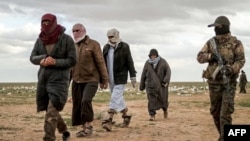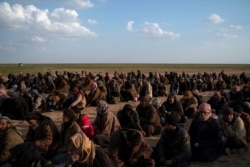U.S. efforts to have European countries immediately take back men and women who left to fight with the Islamic State terror group in Syria are meeting with unexpected resistance from U.S.-backed forces on the ground.
Officials with the political wing of the U.S.-backed Syrian Democratic Forces, say they will only agree to release the thousands of foreign fighters after they have been tried for their crimes in Syria.
"We want to sentence them in our area, so they don't run from punishment," Ilham Ahmed, co-chair of the Syrian Democratic Council, said Wednesday in Washington during a meeting with a small group of academics and journalists. "This is what we insist on."
The SDC estimates it is currently holding 2,200 IS foreign fighters, as well as another 6,000 who are mostly from Syria.
Almost all of them are being held in converted school buildings and other makeshift prisons set up following the fall of the last IS Syrian stronghold of Baghuz last March. But U.S. officials have warned of repeated breakout attempts, adding the situation is "not sustainable."
Ahmed, speaking through an interpreter, admitted the prisons "are not equipped" to hold the captured IS fighters for the long term.
Still, she and other officials said the only way forward would be to charge and try the fighters through international tribunals set up in areas of Syria controlled by U.S. and coalition-backed forces.
"The crimes were committed in our area against the people of our area," she said. "If we put them on trial in our area, that will show we are making justice."
Pushing repatriation
U.S. officials, until now, have balked at such demands, insisting that countries take back not only their foreign fighters but also wives, children and other family members that left or were taken to join IS.
"Repatriation to countries of origin, followed by effective prosecution, rehabilitation, reintegration is the best way to ensure that these dangerous individuals cannot return to the battlefield," State Department Counterterrorism Coordinator Ambassador Nathan Sales said Wednesday in New York, following a series of meetings at the United Nations.
In addition to the more than 2,000 IS foreign fighters in SDF custody, the United States estimates there are an additional 70,000 wives, children and other family members who are being detained at displacement camps, like the al-Hol camp, across northeastern Syria.
Sales said some counties, like Kazakhstan, Morocco and North Macedonia, deserve praise for their efforts to repatriate fighters and their families, but warned too few countries, especially those in Western Europe, have done enough.
"We think that nations that have established rule of law traditions, nations that have deep pockets and the financial resources to address this problem are the ones that should be leading the world by example," the State Department counterterrorism coordinator said.
"This has the potential to be a disaster in the making," he added.
For now, the SDF has managed to relieve some of the pressure by trying and settling the cases of some Syrian IS fighters locally.
That process has included "sentencing fighters who are proven to have committed crimes," a State Department official told VOA last month.
Some IS family members, including some who had been among the 70,000 people held at the al-Hol displacement camp, have also been released.
"We are sending them back after guarantees coming from the head of the tribes in the area," the SDC's Ahmed said.
Growing frustration
But she said officials in neighboring Iraq have yet to make good on promises to start taking back tens of thousands of IS family members, as well as other Iraqi refugees in SDF-controlled areas.
Last week, U.S. President Donald Trump expressed growing frustration with the reluctance by so many countries, and European countries in particular, to take back residents who left to join IS.
Trump, speaking in the Oval Office during a meeting with the Australian prime minister, repeated threats to dump captured IS fighters at Europe's doorstep.
"At some point I'm going to have to say, 'I'm sorry, but you're either taking them back or we're going to let them go at your border,'" Trump told reporters.
Despite the threat, SDC officials said there had been no talks with the U.S. about releasing, or moving, IS fighters from Europe outside of the existing repatriation processes.








